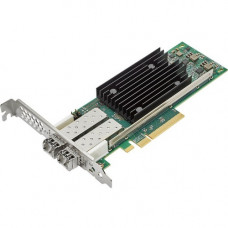Shopping Cart
0 item(s) - $0.00- Accortec, Inc.
- Addon Tech
- Advantech Co., Ltd
- Axiom
- BLACKBOX
- C2g
- Chief Manufacturing
- Cisco
- Dell
- EATON
- EMC
- Enet Components, Inc.
- Fortinet
- Getac, Inc
- HP
- HPE
- IBM
- Intel
- Legrand Group
- Lenovo
- Lexmark
- Middle Atlantic Products, Inc
- Monoprice, Inc
- National Products, Inc
- Panduit Corp
- StarTech.com
- Supermicro
- TDK
- Tripp Lite
- Veritas Technologies Llc
HPE SN1610Q 32Gb 2-port Fibre Channel Host Bus Adapter - PCI Express 4.0 - 32 Gbit/s - 2 x Total Fibre Channel Port(s) - SFP+ - Plug-in Card R2E09A
Add to Compare
32 Gb High-performance Fibre Channel Host Bus Adapters HPE SN1610Q 32Gb Fibre Channel Host Bus Adapter offers higher bandwidth, better latency, enhanced security, and operational efficiency for 32 GFC storage area networks. Performance of up to 2 million IOPS and 12,800 Mbps of aggregate throughput. Simultaneous support for FCP-SCSI and FC-NVMe to make transition from legacy SCSI environments to new NVMe environments seamless. Higher performance with existing server investments when compared to 16 Gb FC adapters. More data moved per watt of power consumed when compared to 16 Gb FC adapters. High Performance and Enhanced Capability for Critical Workloads and High SLA Environments HPE SN1610Q 32Gb Fibre Channel Host Bus Adapter supports N_Port ID virtualization (NPIV), virtual machine ID (VM-ID), and industry standards-based class-specific control (CS_CTL). These provide end-to-end quality of service (QoS). Improve database transactional performance, enable faster business decisions with better data mining, and host more VMs. Port isolation design delivers deterministic and scalable performance on each port. Provides hardware root of trust to protect against malicious firmware downloads. Lower Total Cost of Ownership HPE SN1610Q 32Gb FC HBA integrates with HPE SmartSAN, HPE Smart Fabric Orchestrator, HPE B-Series, and HPE C-Series switch management platforms, reduces total cost of ownership (TCO) and improves reliability. Support for Fabric Assigned - World Wide Network (FA-WWN) and Fragment-Based Lead Discovery (F-BLD) provides fabric pre-provisioning services to simplify SAN deployment and orchestration. With support for features such as D-port diagnostics, Link Cable Beaconing (LCB), Read Diagnostic Parameters (RDP), enhanced FDMI, FC Ping, and FC Trace Route, administrators can quickly run many automated diagnostic tests to assess the health of links and fabric components. PCI Express (PCIe) 4.0 Support HPE StoreFabric SN1610Q 32Gb Fibre Channel Host Bus Adapter includes PCIe 4.0 and provides better interconnect performance bandwidth when compared to PCIe 3.0.
Technical Specifications:
Total Number of Fibre Channel Ports: 2Host Interface: PCI Express 4.0Data Transfer Rate: 32 Gbit/sExpansion Slot Type: SFP+Form Factor: Plug-in CardHeight: 2.7"Width: 6.6"Weight (Approximate): 4.23 oz
Write a review
Your Name:Your Review: Note: HTML is not translated!
Rating: Bad Good
Enter the code in the box below:


